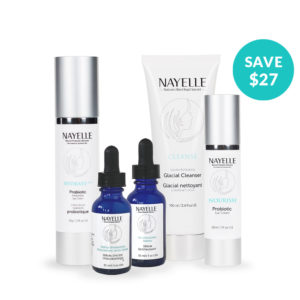Retinol, Retinoids and Retin-A. The Work Horses of our Skin Cell System
Retinol, retinoids or retin-A are all forms of vitamin A. Research has shown that these vitamin A forms are the anti-aging work horses of our skin cell system. As we age, our skin elasticity decreases and cellular turnover increases, giving way for wrinkles to appear. Our love of sun tanning combined with the pollution in our environment overburden our skin with free radicals that our skin cells need to fight.

In order to be effective, all forms of vitamin A-retinol, retinoids or retin-A and other vitamins must be converted in our skin (with the help of enzymes) to retinoic acid. This is a slow process and depending on the form of vitamin A, it may take anywhere from 2-8 weeks. The main difference between prescribed retinol products and retinol found in skin care products is the speed of conversion to retinoic acid. It is important to note that beside the conversion speed difference, there is no other benefit. This is a crucial point as we are prone to think “more is better” and “faster is better”, but this is not the case with vitamin A. The key thing to remember when it comes to vitamin A is “take it slow and easy”.
One must also be aware of the overuse of retinol. It can be linked to dry and irritable skin. Pregnant women are also cautioned to avoid using products containing retinol.
One of the biggest myths surrounding retinol is that it will make your skin more prone to sun damage. What actually happens is that the Sun’s rays may stop retinol conversion to retinoic acid. For this reason using retinol based products as a night treatment makes a lot of sense.
Look for products that have any vitamin A derivate in their formulation and remember it takes time for those derivates to activate to retinoic acid. Probiotic skin care lines using milk, yogurt or kefir are natural sources of vitamin A, retinol, beta carotene or some other forms of vitamin A. Vitamin A is also found in some premium oils like rosehip or moringa which are often used in face oil formulations.
In summary, when it comes to vitamin A, it is beneficial to take small dosages of any available form of vitamin A and give it time to work. You did not develop wrinkles in a week so do not expect to get rid of them in seven days. Natural superfood skin care lines with probiotics will provide a constant stream of vitamin A into your skin. This will give you the same long term benefits as prescribed retinol products.

